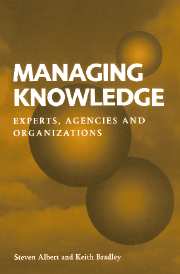Book contents
- Frontmatter
- Contents
- List of figures
- List of tables
- Introduction: the supply-side in context
- Part 1 Expert employees and their new organization
- Part 2 The labour market and the expert employee
- Appendix A Formal exposition of Winston model
- Appendix B Agency employment and search costs
- Notes
- References
- Index
Introduction: the supply-side in context
Published online by Cambridge University Press: 23 November 2009
- Frontmatter
- Contents
- List of figures
- List of tables
- Introduction: the supply-side in context
- Part 1 Expert employees and their new organization
- Part 2 The labour market and the expert employee
- Appendix A Formal exposition of Winston model
- Appendix B Agency employment and search costs
- Notes
- References
- Index
Summary
… it is their own will, their own ideas and suggestions, to which they will demand that effect should be given, and not rules laid down for them by other people.
J. S. Mill, Principles of Political EconomyInternational competition has squeezed profits in traditional commodity-based industries. Indeed, the fact that today commodities are available to everyone through market transactions suggests that they do not provide the same competitive advantage they did in the earlier twentieth century. The same can be said of finance and industrial processes. The former can be borrowed and the latter copied. Paralleling the dampening of traditional factors of competitive advantage is the rise in the importance of knowledge to the future well being of capitalism. Throughout the United States and Britain, and much of the industrialized world, we observe significant increases in knowledge-based industries. Thus, for many people work is being transformed: from the delivery of tangible products produced by manual labour to the delivery of knowledge-based products produced by the expertise of people. Consequently, the contemporary workforce is increasingly comprised of professional knowledge-based employees such as lawyers, accountants, managers, bankers, marketing and advertising executives, scientists, engineers, doctors, computer programmers and all those employees who support such occupations (see e.g. Silvestri and Lukasiewicz (1991)). Such knowledge workers are poised to play a leading role in the growth industries which include computers, biotechnology, robotics, telecommunications, pharmaceuticals, law and medicine. This transformation of the type of work performed, together with technological innovations which transform the workplace, suggest dramatic changes in the work environment of organizations, and the set of choices open to expert employees (see Ritzer (1989) and Reich (1993)).
Information
- Type
- Chapter
- Information
- Managing KnowledgeExperts, Agencies and Organisations, pp. 1 - 14Publisher: Cambridge University PressPrint publication year: 1997
